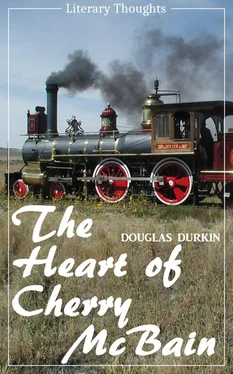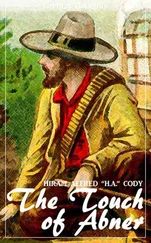"I can do it," he said aloud to himself, "and I believe – if anything – it's a bigger piece."
Even as he spoke he became aware of someone watching him. Something suspiciously like a chuckle came from the bushes near by and he raised his eyes quickly. Not more than a dozen paces away, half-hidden in the shrubbery, stood a girl knee-deep in the matted vines, a sheaf of wild roses in her arms.
For a moment King was unable to stir. It was as if an apparition had suddenly broken in on his imagination – a riotous apparition of dark hair, laughing eyes and delicate pink roses.
When he came to himself he moved back awkwardly and was in the act of lifting the bridle-rein when he was arrested by a burst of laughter that caused him to turn again and stand looking at her, the bridle-rein hanging loosely in his hand. His look was a question – and her only answer was a laugh as she came out from the cover of the bushes and stood upon the log that King had just moved from the other side of the trail. From this position of advantage she looked at him, her eyes almost on a level with his.
"I saw it all," she declared, and King thought the expression on her face was less mischievous now.
"What?" he asked.
"You take a dare from a man and walk away to have it out by yourself with a log."
There was a flash of fire in her eyes as she spoke and King became the victim of mingled anger and self-reproach. While he hesitated to make a reply the girl hopped down from the log and, brushing past him, walked quickly down the trail towards the camp.
When she had gone almost out of easy hearing distance he straightened himself suddenly.
"I didn't!" he called after her, but she paid not the slightest heed.
A minute later he started off for the camp afoot, his horse following behind him. And as he went he thought over the words in which he found nothing but reproach, and worst of all – contempt.
"'You took a dare,'" he repeated, and then to himself he said over and over again, "I didn't – I didn't!"
A little more than an hour later King left the cook-camp and went to the corral where his horse, well rested from the first half of the journey, stood ready and waiting for him.
He was in the act of throwing the saddle onto the horse when he stopped suddenly and listened. From round the corner of the corral came the sound of voices of men in dispute.
"Any man who tries to call Bill McCartney had better be sure he holds a good hand," the most emphatic of the speakers declared.
In affairs of this kind King Howden had a kind of instinct that he invariably trusted. Something told him that the man whose name he heard was the big foreman whom he had seen on the grade before supper. He felt, too, that he himself was under discussion, and laying the saddle down he walked quietly to the corner and listened for a moment. He had no liking for eavesdropping, and yet – he had not recovered from the sting of the words that had fallen from the lips of the girl; the look of reproach in her dark eyes was still vividly before him. But those words were the words of a girl. When men speak disparagingly of another, the case is a different one.
He stepped round the corner of the corral and stood before a half dozen of McBain's men lounging upon bales of pressed hay, smoking after-supper pipes.
For a moment there was a silence so tense that even King, who might have been prepared for it, began to feel uncomfortable.
"No use bluffin'," said one of the group at last. "We were talkin' about you an' Bill McCartney. Looked for a while like someone was in for a lickin' this afternoon."
King looked at the speaker. He was an old man, too old, really, to be combatting the rigors of camp life. His voice was thin, even high-pitched, but King could not help observing the very apparent effort the old man was making to be pleasant. And yet, the line where King's lips met drew straight and tightened perceptibly.
"My boy," the old man went on, very pleasantly but not patronizingly, "don't bother Bill McCartney. We don't love him none – but we talk when he ain't 'round." He was speaking very directly now and had begun to fill his pipe deliberately. "The boys can tell you about him. There's a hardy youngster here in camp by the name of Lush Currie – "
The old man was interrupted suddenly by the laughter of the other members of the group. At first he seemed ready to join in the chorus he had unwittingly provoked, but he glanced once at King and checked himself immediately. Then he turned to the men with a look in which there was a mingling of anger and appeal.
"Well," he said abruptly, "what are you laughin' at?"
If the remark relieved the old man's embarrassment it certainly did not check the hilarity of the men. But when King stepped forward and looked at them with a slow smile playing about the corners of his lips and drawing the lines of his mouth even more tensely, the laughing ceased at once and the men waited in silence for him to speak.
"Don't you go to making plans for me and this man, McCartney," King said, and his steady gaze seemed to take them all in at once as he spoke. "You better get straight on this – McCartney hasn't done me a speck o' harm – not yet he hasn't."
"Pray goddlemighty hard he don't!" replied one of the men, but the remark elicited scarcely more than a smile from the others – and not even so much as a smile from the old man.
"And I'm not going to lose time praying about it, either," King observed, his eyes upon the speaker.
He turned and went back to his horse, where he proceeded in a leisurely way to adjust the saddle. In a few minutes he was ready to leave, and was on the point of getting up when he heard a step approaching, and pausing to look behind him observed the old man coming round the corner of the corral. He was alone, and as he came forward he took his pipe from his mouth and tapped the bowl gently against the palm of his hand to empty it.
"My name's Gabe Smith," he said in his high, thin voice, "an' yours?"
King gave him his name.
The old man extended his hand cordially, and King, recognizing at once that the overtures were meant to be friendly, could not help feeling warmly towards him. They exchanged a few words that served to confirm King's opinion of the sincerity of old Gabe Smith, and then, getting into his saddle, King turned his horse's head down the trail.
Just once before he urged his horse into a gallop he turned and looked behind him.
"Sal, you!" he called to his dog.
At the summons the dog leaped from the side of the trail and the three went off together in the gathering dusk.
It was, perhaps, only natural that King's mind should dwell more or less upon the disturbing element that, during the past few hours, had come unbidden into his life. Early that afternoon his mind had been occupied mainly with memories of a past that had been woven out of failure and disappointment and shapeless motive. Now, with an open trail before him, his mind was filled with new hopes and strange misgivings.
His misgivings were not without good reason, had he known the full truth. Bill McCartney, the big foreman with Keith McBain's outfit, commanded the respect which hard-fisted men invariably pay to those whose reputation for heavy hitting goes before them wherever they move. When he came to Keith McBain's camp his reputation had preceded him by at least a week. By some mysterious way, for which there is no accounting, the men had been prepared for days against the coming of one who could hit harder than any man west of North Bay. It was not on record that any of the citizens of the town that set the eastern limit to the extent of McCartney's reputation could actually hit harder, or even as hard, as the formidable foreman. It probably never occurred to anyone to carry his investigations so far. It was enough that North Bay should be generally accepted as the point that marked the division between two worlds, in one of which the name of Bill McCartney had never been known, in the other of which his name was mentioned with the deference due to men of his class.
Читать дальше












